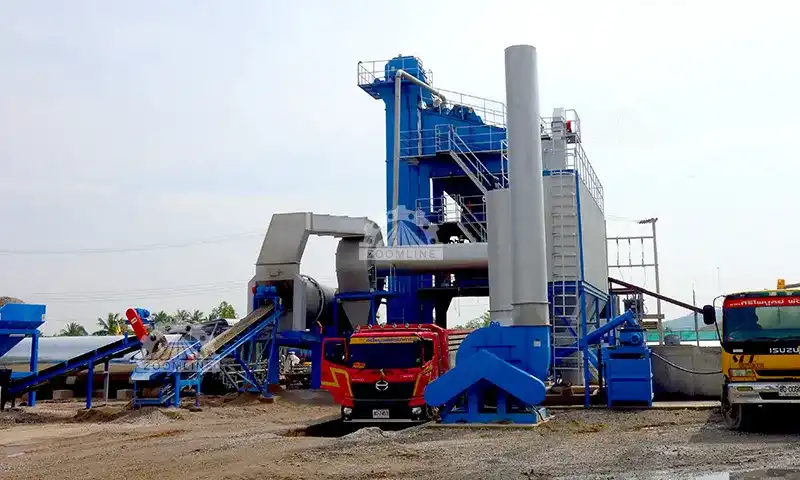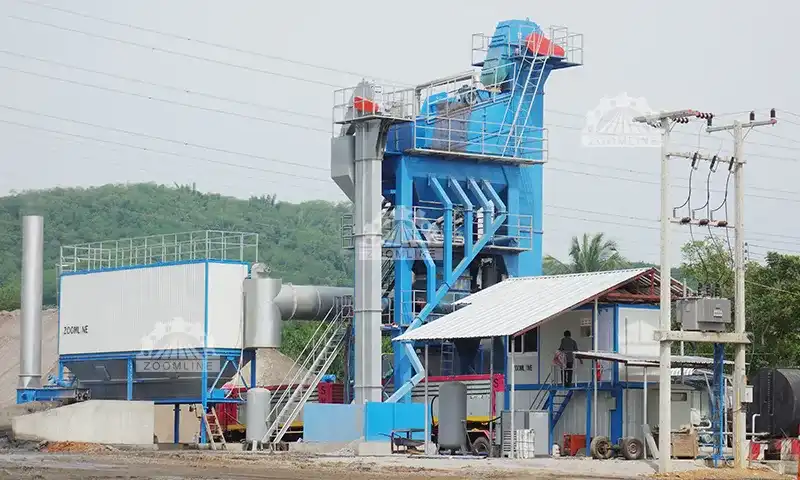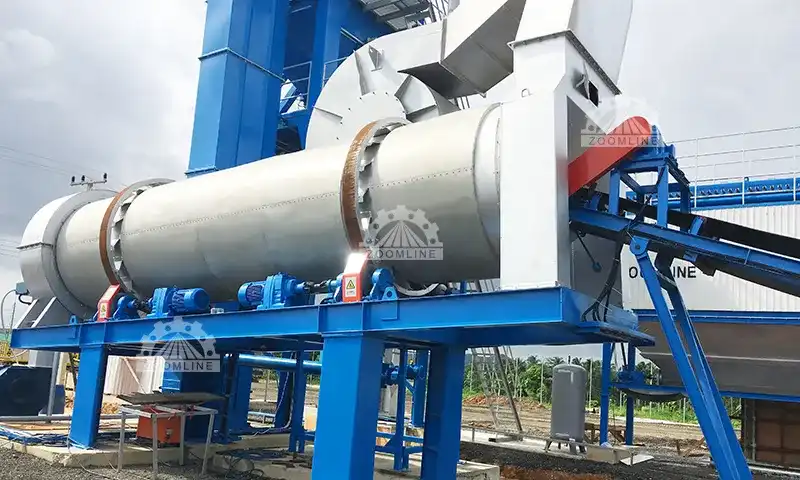The stable operation, production efficiency, and finished product quality of an asphalt mixing plant depend not only on the performance of the main equipment but also critically on the support of high-quality components. From burners and dust collectors to mixing blades and weighing systems, each component functions as the “joints and nerves” of the equipment, directly impacting the plant’s production continuity, the uniformity of asphalt mixtures, and the overall service life of the machinery. Selecting compatible, high-quality components enables plants to achieve optimal operation characterized by “low failure rates, high output, and low energy consumption.” Conversely, substandard or mismatched parts may cause frequent shutdowns, skyrocketing maintenance costs, and even compromise project quality. This guide provides a scientific approach to selecting asphalt mixing plant components, covering core selection logic, key factors, and common component selection techniques. It empowers purchasers to avoid pitfalls and make precise decisions.
The core function of a mixing plant is to produce uniform, stable asphalt mixtures, and components directly govern this process: Precise weighing systems ensure raw material ratios (aggregate, asphalt, etc.) remain within acceptable tolerances; wear-resistant mixing blades and liners guarantee thorough mixing to prevent clumping or segregation; efficient burners consistently deliver the heat required for drying, ensuring aggregate moisture content meets specifications. Premium components reduce equipment failure rates by over 30%, streamlining production workflows.
Substandard or mismatched parts are “hidden cost killers”: for instance, weak elevator chains prone to breakage can halt entire production lines for hours; Dust collectors with poor sealing cause dust leakage, incurring environmental penalties and frequent filter bag replacements; non-original burners may consume excessive fuel, increasing energy costs by 15%-20% over time. Industry data shows that downtime losses due to component issues average 12% of a mixing plant’s annual operating costs—far exceeding the premium paid for high-quality parts.
Amid increasingly stringent environmental regulations, energy-saving and emission-reduction capabilities of components have become mandatory requirements: High-efficiency dust collectors (such as pulse-jet baghouse dust collectors) can control dust emissions below 10mg/m³, meeting national standards; Energy-efficient burners reduce fuel consumption while lowering emissions of pollutants like NOx; Intelligent control systems optimize production processes and reduce electricity consumption. Selecting environmentally compliant components not only mitigates regulatory risks but also qualifies enterprises for policy subsidies, enhancing overall competitiveness.

Batching plants of different brands and capacities vary in design specifications, installation dimensions, and interface standards. Component selection must be precisely matched: for example, the load-bearing capacity of an elevator chain for a 120t/h plant differs significantly from that of an 80t/h unit. Original equipment manufacturer (OEM) control systems may use communication protocols incompatible with third-party components, causing data transmission errors.
Selection Tips:
Prioritize verifying equipment brand, model, capacity, and other parameters by referencing the original manufacturer’s technical manual;
When uncertain, contact the equipment manufacturer or accessory supplier, providing equipment nameplate information and technical drawings to confirm interface, dimensional, and power compatibility details;
Avoid blindly pursuing “universal” accessories; for critical components (e.g., control systems, burners), select original manufacturer products or those certified by the original manufacturer.
Asphalt mixing plant components endure prolonged exposure to high temperatures, abrasion, and corrosion. Material quality directly determines service life:
Wear-resistant parts (mixing blades, liners, elevator buckets): Select high-manganese steel or wear-resistant alloy steel with surface hardness ≥ HRC55 to ensure a minimum service life of 8,000 hours.
High-temperature components (burner nozzles, dryer cylinder liners): Must possess high-temperature oxidation resistance, capable of withstanding prolonged operation above 300°C;
Sealing/corrosion-resistant components (dust collector filter bags, hydraulic seals): Filter bags should use PTFE-coated materials for temperature resistance, waterproofing, and dust non-stick properties; seals require oil resistance and aging resistance to prevent leakage.
Premium components must not only “function” but also “perform well,” focusing on these key metrics:
Burners: Thermal efficiency ≥90%, enabling precise temperature control and compatibility with various fuel types (diesel, heavy oil);
Weighing systems: Measurement accuracy error ≤±0.3%, rapid response to prevent raw material ratio deviations;
Dust Collector: Airflow capacity must match plant production volume, filtration efficiency ≥99.9%, pulse-jet cleaning method to reduce manual maintenance;
Control System: Supports automated operation and data networking, enables real-time monitoring of equipment status for remote diagnostics and parameter adjustments.
Purchasing components is not a one-time transaction; comprehensive after-sales support prevents future complications:
Select suppliers offering installation guidance and commissioning training to ensure rapid component adaptation;
Prioritize manufacturers with global service networks to guarantee timely access to technicians and spare parts during failures;
Verify warranty periods—critical components (e.g., burners, control systems) should carry at least one year of coverage, while consumables (e.g., filter bags, seals) require assured spare supply.
Low-cost components may seem to reduce procurement expenses, but their short lifespan, high energy consumption, and frequent failures can double the total cost of ownership. Calculate the “full lifecycle cost” during selection:
Premium components may cost 10%-20% more upfront but extend service life by over 50% and reduce maintenance frequency, resulting in lower overall costs;
Example: Premium mixing blades (¥8,000 each, 10,000-hour lifespan) vs. low-cost blades (¥5,000 each, 4,000-hour lifespan): The former has a unit time cost of ¥0.8/hour, while the latter costs ¥1.25/hour, making the former more economical over extended use;
Prioritize “value alignment”: Select components matching the batching plant’s usage frequency and project requirements. Opt for high-end products for core components (e.g., control systems, burners), while balancing costs for wear parts while ensuring quality.
Select by fuel type: Diesel burners suit small-to-medium mixing plants, heavy oil burners cater to large high-capacity equipment, while natural gas burners offer greater environmental friendliness (requires gas supply availability);
Prioritize thermal efficiency and temperature control precision: Choose burners with automatic temperature control systems that adjust flame intensity based on aggregate moisture content to reduce fuel consumption;
Prefer products featuring low-nitrogen emission technology to comply with new environmental regulations.
Select by airflow capacity: Calculate required airflow based on plant capacity (e.g., a 120t/h plant requires a dust collector with ≥18,000m³/h processing capacity);
Filter bag material: Select PPS material for high-temperature applications (e.g., dryer outlet), and polyester membrane-coated material for ambient temperatures to ensure filtration efficiency and service life;
Cleaning method: Pulse-jet cleaning is more efficient than reverse-air cleaning, reducing filter bag clogging.
Material Selection: Use Mn13Cr2 high-manganese steel wear-resistant alloy, or enhance surface hardness via plasma spray welding;
Structural Design: Select blades with guide channels to improve mixing uniformity; liner plates must match blade clearance (recommended ≤5mm) to prevent material residue;
Brand Certification: Prioritize manufacturers certified under ISO9001 quality systems to ensure material compliance.
Sensor Accuracy: Select load cells with accuracy ≥0.1% to ensure precise raw material ratios;
Protection: Incorporate waterproof, dustproof, and vibration-resistant designs for harsh mixing plant environments;
Display & Control: Support digital readouts and automatic compensation for real-time weighing data feedback.
Chain Material: 20CrMnTi alloy steel, carburized and quenched, with tensile strength ≥1500MPa;
Bucket Design: Select deep-trough structure to enhance aggregate conveying efficiency and prevent spillage;
Matching Sprockets: Must be fully compatible with chain model, with surface hardness ≥HRC60 to reduce wear.

Select suppliers specializing in asphalt mixing plant components for over 5 years, possessing mature production processes and technical expertise;
Verify certifications: ISO9001 Quality Management System, Environmental Product Certification (for dust collectors and other eco-friendly components), CE Certification (for export-compliant equipment).
Request supplier references for similar projects (e.g., municipal works, highway mixing plant collaborations) to verify component performance in real-world applications;
Review client feedback: Assess after-sales service reputation and component quality through industry forums, social media, or third-party platforms.
Prior to bulk orders, arrange factory visits or video inspections to evaluate production facilities and quality control processes;
For critical components (e.g., mixing blades, sensors), request samples for material testing or small-scale trials to validate performance.
Confirm supplier’s spare parts inventory capacity and whether wear parts can be delivered within 72 hours;
After-sales service response time: Can technicians arrive on-site (or provide remote guidance) within 48 hours after fault reporting?
Extended Equipment Lifespan: Premium components reduce wear on main units, extending the overall service life of mixing plants by 3-5 years;
Enhanced Production Efficiency: Reduced failure rates increase annual effective production time by 10%-15%, significantly boosting output capacity;
Lowered Overall Costs: Maintenance expenses decrease by over 40%, energy consumption costs drop by 10%-20%, and return on investment improves by 25%;
Ensured Project Quality: Consistent asphalt mixture quality minimizes rework due to material issues, enhancing corporate reputation.

Selecting asphalt mixing plant components is fundamentally a “value investment”—high-quality, compatible parts not only resolve immediate production challenges but also generate long-term cost savings and value. Purchasers should abandon the “lowest price first” misconception, conducting comprehensive evaluations across compatibility, materials, performance, and service to choose reliable suppliers.
If you encounter specific challenges in component selection—such as compatibility with particular mixing plant models, capacity matching, or cost control—contact ZOOMLINE. With 20 years of expertise in asphalt mixing plant equipment and component R&D, we deliver customized solutions, original equipment manufacturer (OEM) quality assurance, and a global after-sales service network. Ensure your mixing plant maintains peak efficiency and stable operation!